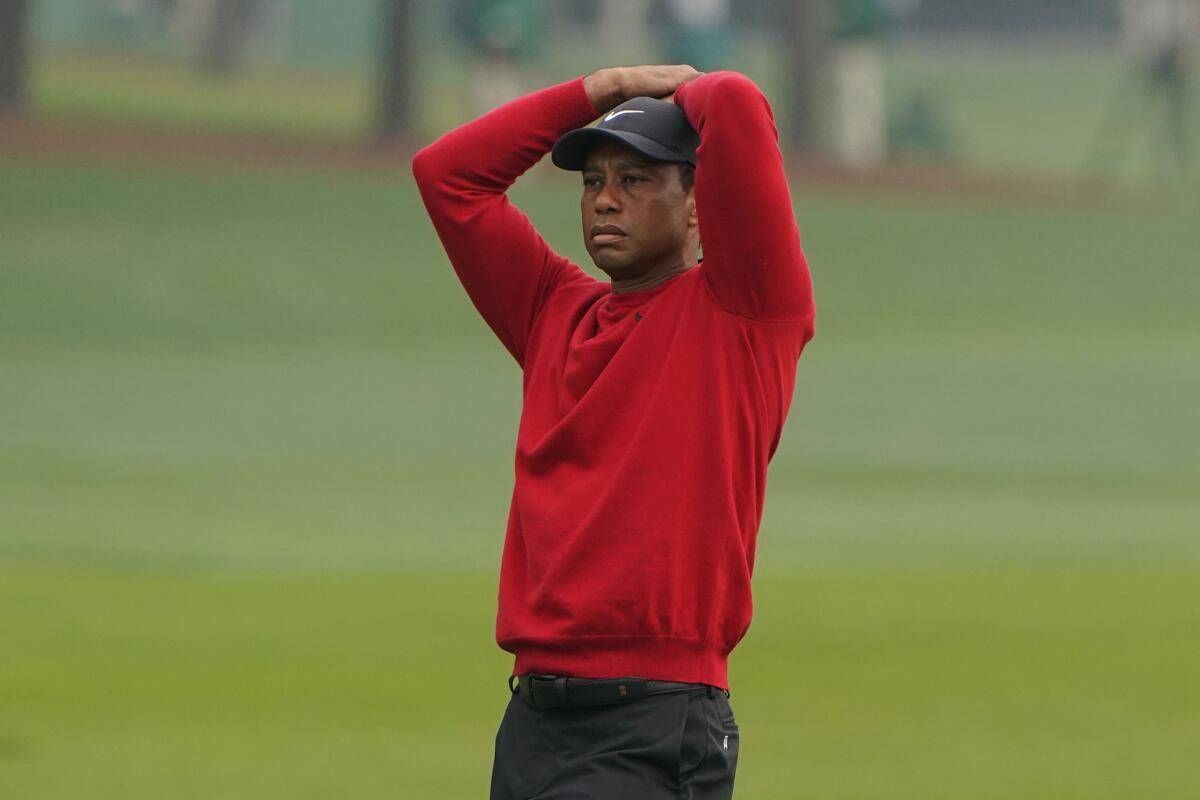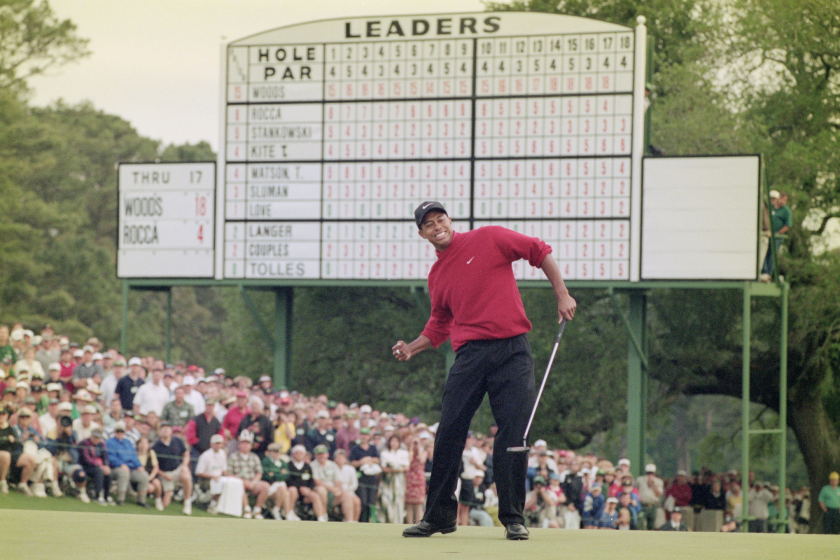Afraid to upset its subject, sources for HBO’s Tiger Woods doc took some convincing

- Share via
Many viewers who tuned into the first episode of “Tiger,” HBO’s probing documentary about his rise to golfing greatness, his dramatic fall from grace and his more hopeful future, likely had one question: Did Tiger Woods watch?
The filmmakers behind the series, the second and final installment of which runs Sunday, seriously doubt that Woods caught the premiere or that he’ll be tuning in to Part 2, which covers the disastrous personal and professional fallout after tabloid revelations of several extramarital affairs and a series of crushing injuries that derailed his meteoric momentum.
For the record:
12:18 p.m. Jan. 14, 2021An earlier version of this story transposed several quotes attributed to Matthew Heineman with those attributed to his “Tiger” co-director Matthew Hamachek.
But they certainly have feelings about how they would like Woods to react if he were to take the time to watch.
“There’s probably a world of difference [between] what I would hope for and what will probably be his response,” said co-director Matthew Hamachek,. “What I hope that he would see is that we took a very complex life and that we portrayed it in an incredibly nuanced way. That’s about all we could hope for. It’s very complicated.”
“Tiger” follows “The Last Dance” as the second major TV documentary that provides a penetrating — and often unflattering — portrait of an iconic Black athlete whose excellence and charisma swept him into the top ranks of popular culture. But while “The Last Dance” had the blessing of its primary focus, basketball legend Michael Jordan, “Tiger” was done without the cooperation or approval of its subject.
‘Tiger,’ premiering Sunday, makes clear that the near-cosmic significance attached to Tiger Woods’ talent was, at least in part, a marketing scheme.
Although Woods embraced golf, he was visibly uncomfortable with the quest by his father, Earl Woods, for him to be a unifying force that could help combat racism. Though he had a Black father and an Asian mother, Tiger resisted being defined as being Black, using the term “Cablinasian” to describe his multiracial identity. And unlike Jordan, “Tiger” reveals, he was often uncomfortable in the spotlight.
Said Hamachek: “He was presented to the world by his father as someone who would transcend the sport and unite the races. There were all these identities and expectations thrown on Tiger, and they built him up to be this superhuman character. When he revealed himself to be human in 2009, they jumped on him with both feet, and that lasted until 2018, when he began to play golf again, and all those people who had jumped on him started to build him up again.”
Executive producer Sam Pollard said “Tiger” shows the cultural dilemma that seemed to frustrate Woods.
“Black athletes have to decide what road they are going to go down, and it’s a delicate one,” he said. “It’s ‘Do I want to be a part of the American mainstream and not make waves, or do I want to be someone who stands out and wants things to change?’ It’s a tricky dance.”
Another key element of the series is the charged relationship between father and son. Woods and his father, who died in 2006, referred to each other as “my best friend,” but Earl Woods’ drinking and womanizing as his son became more prominent in golf severely damaged their relationship.
“At the core of the Tiger Woods story is the father-son-mother dynamic, but there were other factors that helped build the mythos of who Tiger Woods is,” said Matthew Heineman, who co-directed the project with Hamachek. “The first part of our film is about the making of that mythos, while the second part is about it breaking down.”
The challenges facing the makers of “Tiger” extended far beyond tracing the trajectory of Woods’ amazing career. Although they talked with several figures from Woods’ past and present, they also encountered reluctance from those “who had a front-row seat to Tiger’s life” who were concerned about the direction of the documentary.
“They had seen what Tiger had gone through all his life, and they didn’t want to be part of something unless they understood what it was going to be about,” Hamachek said. “We had to convince people that we were not going to make the tabloid version of his story and we were also not going to do the glowing piece about his golfing prowess.”
He added: “We were clear in letting them know that this was going to be complex. When we were able to spend the time telling people what we were going to do, we convinced them. But there were others who did not want to participate.”
Woods’ continuing influence on former friends and associates, even though they are no longer in his circle, also shaped the participation of the series’ on-camera sources, which include “Training a Tiger” co-author Pete McDaniel and onetime neighbor Alicia O’Meara, the ex-wife of pro golfer Mark O’Meara.
“They were all in some ways nervous about making sure they were not going to piss him off,” Heineman said. “They were protective of his reputation and didn’t want to upset the apple cart. I found that deeply and psychologically interesting. And let’s be honest: This is a guy that still has a huge legal apparatus surrounding him, so you can connect the dots there.”
The producers say they spent months before successfully getting former hostess Rachel Uchitel, who became Woods’ mistress, to open up about their affair. They also landed a major interview with Woods’ high school girlfriend, Dina Parr.
ESPN and Netflix co-production “The Last Dance” features intimate, never-before-seen footage of Michael Jordan’s final winning season with the Bulls.
The documentary shows never-before-seen home videos of Woods partying and having fun with Parr away from the pressure cooker of sports. When it seemed like their relationship was becoming more serious, Woods’ parents apparently pressed him to end it. She is shown in the documentary reading his terse goodbye letter to her.
“Dina provided such valuable insight into the Tiger we never see,” Heineman said. “He’s smiling and untouched by the world. And then to see him as this assassin on the golf course is amazing.”
Pollard said he was “wowed” by the home video and by another revelatory moment: police footage from Woods’ 2017 arrest in Florida on suspicion of driving under the influence. The video shows Woods struggling to comprehend officers’ instructions after they pull him over. (Woods ultimately pleaded guilty to reckless driving.)
“You see Tiger at his most vulnerable,” Pollard said. “It’s just really astonishing to see that.”
Heineman acknowledged that viewers of “Tiger” might come away with divergent opinions of the golfer, whose persona has now been a subject of watercooler conversation for a quarter century. “But I also hope they realize we didn’t paint him with a simple broad brush.”
‘Tiger’
Where: HBO
When: 9 p.m. Sunday
Where: HBO Max
When: Any time
Rating: TV-MA (may be unsuitable for children under age 17)
More to Read
The complete guide to home viewing
Get Screen Gab for everything about the TV shows and streaming movies everyone’s talking about.
You may occasionally receive promotional content from the Los Angeles Times.








